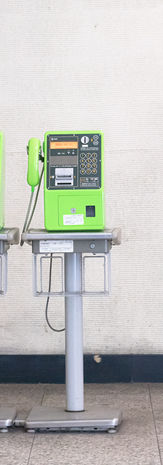JUAN CARLOS PINTO
P H O T O G R A P H Y
時代/Jidai
The word “時代/Jidai” in Japanese translates into English as “Era”. It is composed of two ideograms: “時” meaning time, and “代” meaning age or historical period, but the latter can also mean substitute, change, convert or replace. Putting these meanings into play, the goal of this photographic series is contained within the title word: with each change of era, things, customs and words fall into oblivion and are lost in the endless cascade of time, and others that go up the stream of the years and remain unchanged or that when they cross the discourses of the new era acquire a new meaning. That which is forgotten falls silent and dies forever. That which remains is because it still communicates.
The telephone is the epitome of communication in our era: a world connected by a device capable of carrying the voice across seas and borders instantaneously. However, the telephone in its original form is being buried by its own gift: it revolutionized the telecommunications that are hastening its demise. Especially in the public sphere.
Tokyo’s public telephones have been gradually disappearing. Empty aluminum pedestals can be seen in many places in the capital, like the pillars of an era that is coming to an end in leaps and bounds. But in the basement of Shinjuku Station there are still a couple of public telephones in a space that is in itself a knot of continuity and rupture, for by recording who uses them and how, and who does and does not use them, we can appreciate the social fabric, and his new meanings, of a mega city balanced on the blurred border of two eras that refuse to stop communicating. What’s more, the boundary is not just drawn in time, but also in space: Public space and private space are interwoven, as we live in an era where our communications, regardless of their nature, fit in our pockets. Thus, in the midst of public space, our body and mind require a place that gives a sense of privacy and acts as a shelter for the act of communication, and even for some people it becomes a temporary home.
Therefore, “時代/Jidai” aims to be a minimal portrait of a place where the woven discourses of the society of a mega city intersect, allowing us to ponder our place in this era as communicating entities.









